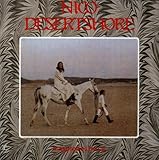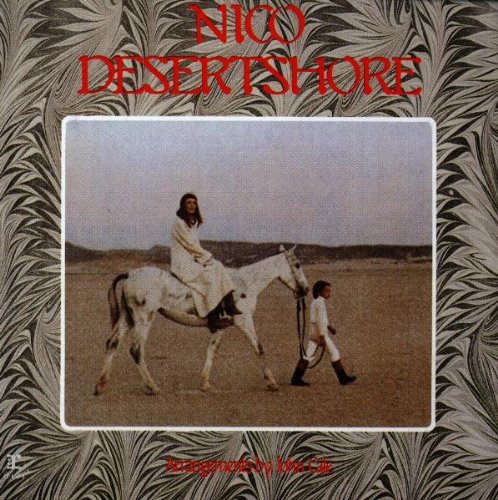Nico Album: «Desertshore»

- Customers rating: (5.0 of 5)
- Title:Desertshore
- Release date:1993-10-26
- Type:Audio CD
- Label:Reprise / Ada
- UPC:075992587020
- Average (5.0 of 5)(12 votes)
- .12 votes
- .0 votes
- .0 votes
- .0 votes
- .0 votes
- 1Janitor of Lunacy
- 2The Falconer
- 3My Only Child
- 4 Le petit chevalierimg 1:14
- 5 Abschiedimg 3:03
- 6 Afraidimg 3:30
- 7Mütterlein
- 8 All That Is My Ownimg 3:29
A local newspaper recently ran a poll (and published a follow-up article) on the albums that readers found had "changed their lives." It didn't even occur to me to submit an entry. I have many albums that changed my life in some sense, just as there have been a number of books and movies that I could also describe in such terms. But for the most part, I find that if they really did change me, it probably has to do more with the cumulative effect of exposing myself to a variety of musical (or literary, or cinematic) works over the course of my life.
In other words, to put it bluntly, my first reaction was that the entire poll was pretty stupid. But then, well after the results had been tallied and the article had appeared, it occurred to me that there really was at least ONE album that had a direct bearing on my life choices, and in effect, literally changed the course of my life.
I was a Freshman in college and already a serious Nico fan when DESERTSHORE was released. I had been kind of shopping around for a major--although it appeared that I would probably end up yielding to pretty much the prediction that everyone I knew seemed to hold regarding my academic career. They all had me pegged as a typical English lit major. Out of sheer contrariness, I felt I had to find something else to specialize in.
Then I heard Nico singing in German--two tracks from DESERTSHORE that apparently came from the soundtrack of a French avant-garde film (by Philippe Garrel) called LA CICATRICE INTERIEURE (the inner scar). Of course, I had heard pop songs and folk songs sung in German before, and there was always something I liked about the sound and the feel of the language, but hearing Nico sing "Abschied" and "Muetterlein" for the first time was just one of those moments. I decided then and there that I MUST learn the German language. Even though, I had already completed my language requirements with French, I signed up for a German course as soon as I possibly could, was completely taken by its sound and structure, went to Germany to study and ultimately got a Masters degree in German language and literature.
Seemed like a pretty good deal at the time...I mean, I got to read books...and learned another language in the process. What could be better? (The fact that I feel like I've been spending the greater part of my adult life trying to play catch-up on English language literature nothwithstanding).
I can't really explain the pull that the entire album (and those two songs in particular) had over me. Nico's English language compositions and vocals had always held a certain allure. They were still fundamentally "foreign" even when sung in my mother tongue. Those mournful vocals with their stretched out vowels, the jagged and sometimes bizarre imagery. No native English speaker would sing like that--or WRITE like that. Cynics--and there were many--might point out that some of the images were almost comically off (e.g. "janitor of lunacy") and there were a number out-and-out mispronuniciations rather than intentional distortions "fal-con-eer" for "falconer." Such things were part of the package--you either bought 'em or you didn't. The self-appointed "dean" of rock critics (you know the guy) once wrote that while he had first thought Nico had charisma, her own compositions convinced him that she was "a fool."
I could go on and on about, say, the cultural difference between a German "Hausmeister" and the faintly comic American figure of the "janitor." But that would be pointless. You either love "Janitor of Lunacy" for what it is and is not, or it means nothing to you. You either allow for the "falconeer" pronunciation and then immerse yourself in the song--or you find it ridiculous and pass it by.
The inclusion of the sweet French children's song "Le Petit Chevalier" sung by her son, Ari, and the two German language tracks should have at least humbled the wiseacre American naysayers a little bit. John Cale has long argued that Nico (and to a large degree, Cale himself) came from a completely different tradition, a European high art tradition, that was in many ways the antithesis of American rock 'n'roll. Hooking up with Lou Reed, changed all that for both Cale and--to a lesser extent--Nico, but once they embarked on establishing Nico's trademark sound for her post-Reed solo albums, they instinctively went back to their avant-garde/medieval European roots. Lou who? Andy who?
And it worked brilliantly on its own terms. THE MARBLE INDEX and DESERTSHORE remain utterly unique in the history of, uh, rock'n'roll. It took a Germanic warrior princess to put the Goth in Gothic. Which is what made INDEX so monumental. It was imperious. Someone below pointed out that DESERTSHORE is a bit warmer than its predecessor, and there's some truth in that. Both albums contain songs dedicated to her son, but DESERTSHORE actually follows "My Only Child" with the chanson actually sung by the young Christian Aaron Paeffgen Delon. But then the mood shifts dramatically from French airiness to Teutonic austerity with "Abschied." Of course, once you know that "Muetterlein" is translated as "Dear Little Mother," you get a hint of the Schmaltz behind the Weltschmerz. But that's part of Nico's appeal. Just when you're sure that she was a ghostly apparition, it turns out that she was someone's mother--and someone's daughter. And an eternal enigma.
Capable of changing someone's life--a little anyway.
That lyric's from my favorite song on this album. That one line from "Afraid" basically sums up most of Nico's life - she was stunningly beautiful, yet she hated her good looks(and later ruined them with heroin and hard living) and could never find one person she could really call her soulmate(well, there was Jim Morrison, but he had died in 71). She was beautiful and she was alone.
But anyway, this is one of her best albums. I personally think this is better than the album that was considered her masterpiece, "The Marble Index"(which is great, but tends to drag a little). Besides the song I just mentioned, there's also the haunting "My Only Child"(not much instrumentation - Nico's booming Wagnerian voice and the backing vocals, which almost sound like a choir, are the things that were put in the forefront of the song), the opening track "Janitor Of Lunacy", "The Falconer", and "All That Is My Own". I would suggest to anyone who wants to start acquiring Nico's albums to definitely pick this one up.
One more note - Another reviewer said that "some French kid" is singing on "La Petit Chevalier". This is actually Nico's son Ari, who was raised by Alain Delon's(Ari's father) parents in France. Just wanted to clear that up.
Nico's music is often gloriously terrifying--especially some of her live recordings. Desertshore demonstrates the "many moods of Nico" and is expertly produced by John Cale. Cale is a man who understands how to make evocative music. From the harrowing beauty of "Abschied" to the delicate and mournful "Afraid", this is an album of great feeling. The mood of this record is quite melancholy. It is very much music to listen to alone in the dark. However, this is still a Nico album. There are moments that are legitimately creepy and fully capable of bleeding into your dreams. Just be aware, that is all.
Desertshore is liturgical and very sombre in places. I keep thinking of cloisters of excommunicate nuns and priests indulging in their lusts while Nico plays her tunes to get them in the mood. There is a warmth to even her most abstract compositions that feels like a cold hand on the shoulder from someone you adore.
I quite enjoy John Cale's playing on this album--especially on "Abschied". The interplay between his viola and Nico's harmonium is exquisite. Indeed, the instrumentation on this album gives it the feel of a collection of chamber pieces. I've always thought that Nico's music would provide an excellent accompaniment to silent horror films. Or, perhaps, a high Gothic opera...
"Meet me at the Desertshore" This disc is centuries ahead & behind its time. Easily the enigmatic artist's most personal recording ever. Unlike her other works, "Desertshore" was entirely, painstakingly, (and very consciously) composed by Nico, while held up on the island of Positano. To me it remains her most pure statement on record. While it is the Pitchest-Black, it simultaneously holds her most exquisite melodies ever recorded. Like a 600 year old ghost singing in a near-dead, exhausted, howl relaying foggy details of humanity's ancient, ghastly history. The more recent observations are delivered in windy, uplifting tonalities that sound as if they were secretly recorded in a medieval prison. Growing up and frozen by her childhood amongst the ruins of Berlin in the '40's, informed her visions against all outside musical influences. Nico's albums sound like absolutely nothing released in the last 25 years. For the critics, I rebut that few, if any artists of the time were even remotely as Original and Authentic as NICO. "Desertshore", (as well as the very rare, "Behind The Iron Curtain"), remain 2 of the most intense and heartbrakingly beautiful records ever recorded.
An absolutely beautiful album, gothic, haunting, but at the same time uplifting. "Janitor of Lunacy", "The Falconer", and "All That is My Own" are especially powerful. The first of these, Luncay, makes one wonder of the possible influence on Nico of being a child in the ashes of wartorn Germany. The second, The Falconer, pulls one back almost literally into the Middle Ages. The third, All That is My Own, from which the title of the album comes ("Meet me on the Desert Shore"), also harkens back to the Middle Ages, with a hint of Middle Eastern influence. "Mutterlein" is also a hauntingly beautiful song (in German). And then, to this, you add the uplifting and positive (despite the title) "Afraid". Truly, a landmark album.

